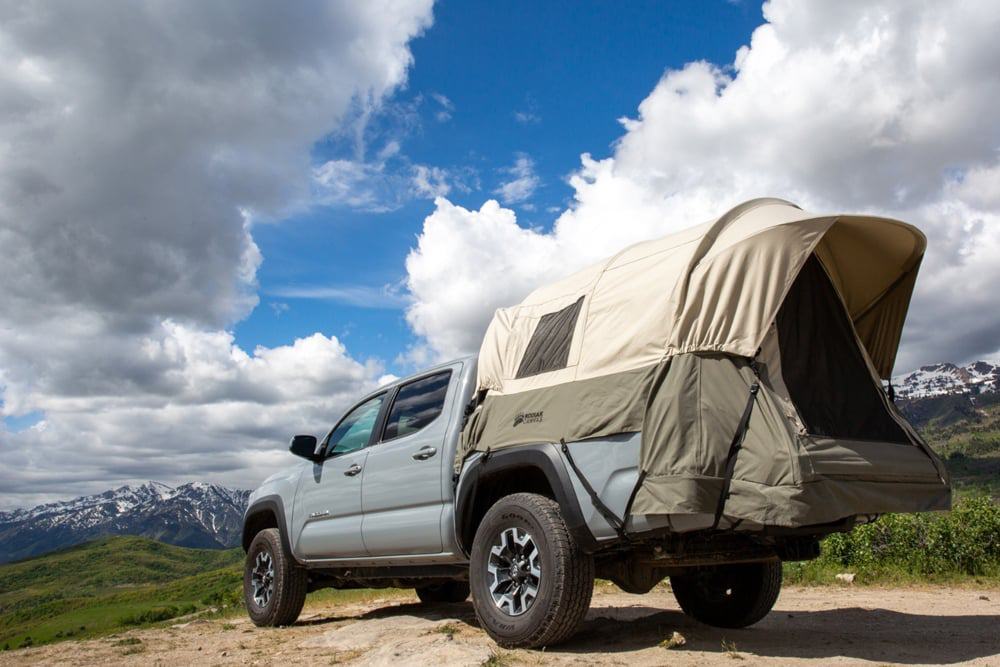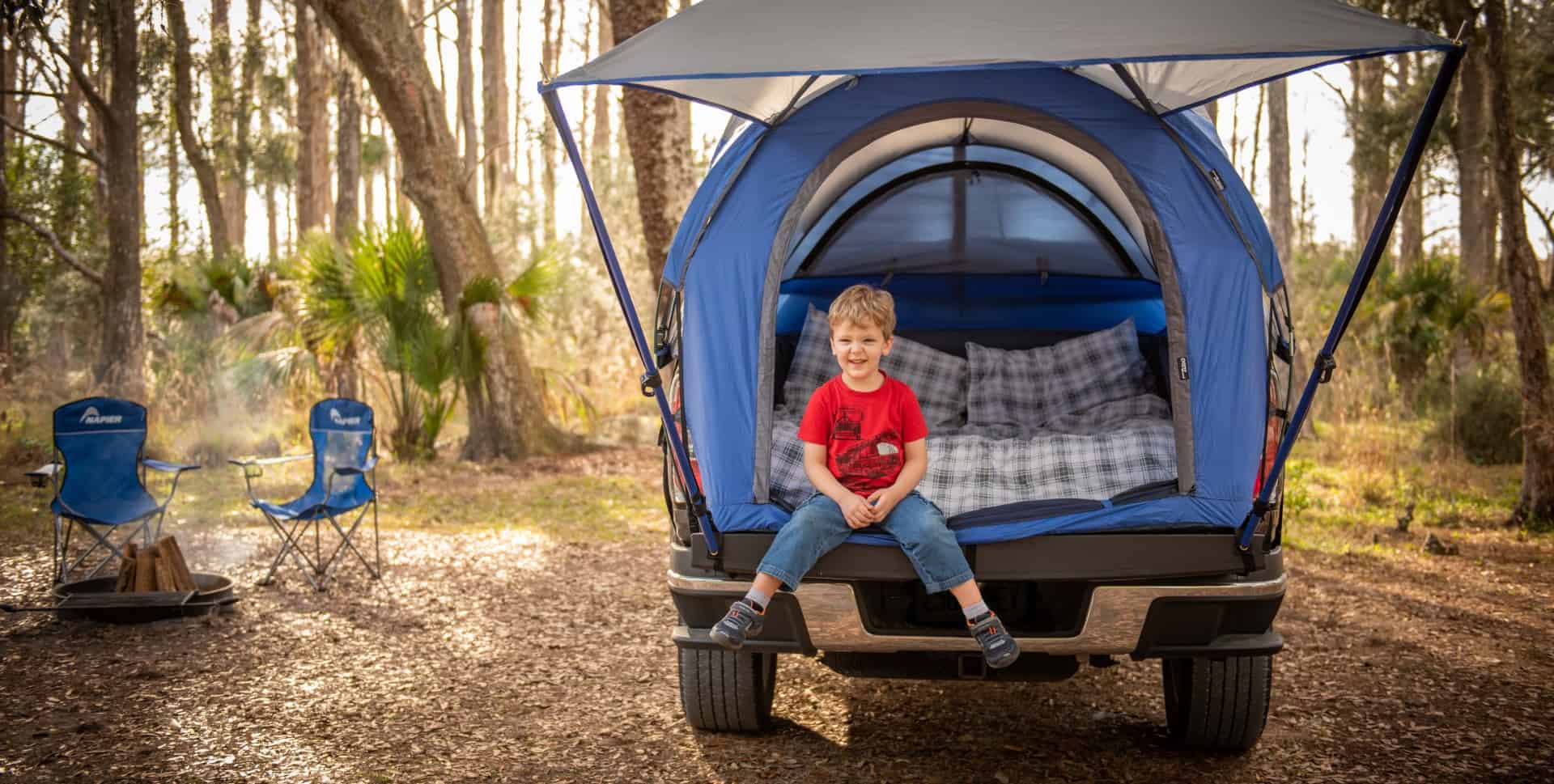Your truck can be a reliable tool for camping, with a decent storage capacity and excellent terrain performance.
But can it double as a tent?
More and more people are trying out truck bed tents as an alternative to regular tents.
So, are truck tents worth it at all? Well, if you’re into Overlanding, you’ll love them!
Related: There’s a world of difference between a good and a bad truck tent. Find out which tents we recommend in our review of the best pickup truck tents for camping.
Is a Truck Tent Worth Buying?
For regular campers, a ground-level tent is usually the most convenient option. It just offers basic camping needs at an affordable price point.
However, if your pickup truck is an essential part of your trips, getting a bed tent might be worth the extra money since it offers more safety and comfort on rugged trains.
Truck Bed Tent Pros:
Let’s take a look at some of the benefits you get with a truck tent:
1. Truck Tents Help You Avoid Sleeping on Roots and Rocks
One common issue for avid campers is uneven terrain, especially those who like going off the beaten path.
You might waste up to an hour clearing the area before you pop up the tent.
Sometimes, roots and branches aren’t exactly easy to lift. At this point, you can either settle for an imbalanced tent or find a new spot.
With a truck tent, you don’t have to worry about all these inconveniences. You always have a clean surface to pitch on.
2. Truck Bed Tents Mean You Don’t Have to Sleep on the Cold Ground
Camping isn’t supposed to be luxurious. We all get that, but it also doesn’t have to be painfully uncomfortable.
The least you could ask for is a nicely padded, warm spot to lay your head on at the end of the day.
You can splurge on padded bedding for a ground-level camping tent with a nice inflatable bed, and thank us later!
Or you can choose to pay a little extra from the get-go and invest in a truck tent. For an extra comfortable layer, cut insulating foam to size and lay it under the bed mat.
The choice is yours, but either way, don’t torture your back sleeping on the cold ground.
3. Avoids Snakes, Spiders, and Other Creepy Crawlies
Why do people think that campers aren’t grossed out easily? As if enjoying the wilderness suddenly means that you’re not terrified of what lurks in the night.
But that just doesn’t make sense.
Of course, no one wants to risk a venomous snake bite or a spider crawling up their face as they sleep!
There are around 5.4 million cases of snake bites around the world annually. The risk increases if you “provoke” the reptile. Say, by disturbing its habitat while pitching a tent.
In that sense, sleeping inside your truck bed might be a safer option. You can be adventurous during the day if you have a sound night to recharge.
4. Drive Wherever You Want and Set up the Perfect Camping Spot
In part, what makes truck bed tent setups particularly unique is the whole “camp-on-the-spot” deal.
If you hate camping in mainstream areas like parking lots, you can pick your ideal spot and drive to it.
Do you want more shade? Maybe you want to find a less crowded area? Or a scenic route? Dream big. As long as you can park your pickup truck there, you’re set for the night.
It’s also nice for long-distance trips where you don’t have the luxury of finding calm campgrounds nearby.
5. Less Concern About Rain Pooling Under the Tent
While it’s still possible to spot rainwater leakage on truck bed tents, it’s usually incomparable to regular ground tents.
Many truck tent models come with a rain fly that drains outside the bed entirely. This way, you don’t have to worry about water pooling around the fabric.
You can also park with the backside slightly tilted downward during heavy pours. This position might not always be possible, but it’s worth a shot.
If you have a floorless model, lay a tarp over your bed to catch any leakage that slips from the rain cover.
6. A Better View out of the Tent
Picture this:
You crawl out of your tent and see uneven grass, bugs creeping on the ground, and long trees blocking your view.
It’s not a pleasant scene to lay your eyes on first thing in the morning.
When you’re propped up above ground level, it’s easier to get a better view. You can catch the sunset and everything on the horizon.
However, it still depends on the type of landscape around you and which way you park your pickup truck.
7. Guaranteed Flat Surface for Sleeping
While it’s not entirely impossible to camp on a slope using a regular camping tent, it’s time-consuming and risky.
The same applies to pitching on sand. You get a lovely view of the beach, but the ground is often too unstable to support the tent.
Truck tents save you all that hassle.
Sure, they’re expensive, but you’ll like knowing that you have a flat spot to sleep on every single time.

Truck Bed Tent Cons:
Because nothing’s perfect, truck tenting also has its downsides.
Let’s take a look at some of the problem areas:
8. Setting up the Tent Means Emptying the Truck Bed
This is the number one problem that people face when they shift to truck tents. It can seem like too much work and it might force you to give up altogether.
Yet, there’s a simple solution.
Try loading all the stuff in your bed in a small box, preferably something with sturdy side handles.
This way, you can unroll your tonneau cover (if you have one) and move the box into the cabin whenever you need to pop the tent.
This not only makes pitching easier, but it also keeps the pickup truck organized and clean at all times. Double win!
9. Often More Expensive Than Regular Camping Tents
Another major downside that often discourages people from truck camping is the price tag.
Getting a regular two-person camping tent is way more budget-friendly than the average truck bed setup.
Don’t forget the additional cost for the storage box to keep the bed empty. You might also need a mat for comfortable padding under your knees.
If you go for a roof-top model, you may need to pay extra to get the kit, including the ladder and the fastening attachments.
10. Space Is Limited to the Size of Your Truck Bed
With regular ground tents, you can go as large as you need. You can even go for family-sized tents that carry upwards of 12 people!
Unfortunately, that’s not the case with truck tents. The actual room depends on your bed size, but we can’t picture more than two adults sleeping in a comfortable position.
Keep in mind that tall people also face some trouble standing upright, but it’s not much worse than most camping tents, anyway.
If you need to boost the space, look into roof tents. However, you’ll be losing some points for conventionality.
11. No Driving When Your Tent Is Set Up
It might sound like a trivial thing, but being able to drive without picking up your camp setup is a plus.
Sometimes, you’re not done with your camp, but you still want to go for a supply run or even just drive around for fun.
If you use a truck tent, you have to wake everyone up and take the tent down before you can hit the road.
What if you don’t, though?
You might lose the tent or obstruct your back view of the road, putting yourself and other cars at risk.
12. You Can Only Camp Where You Can Get Your Truck
Sure, it is nice being able to take your tenting spot away from overcrowded campgrounds, but it’s a double-edged sword.
How come?
On foot, you can go deep into the woods and find serene areas in all the hidden nooks and crannies.
Meanwhile, that is obviously not very practical with a whole pickup truck, no matter how good of a driver you are.
Keep in mind that some hiker’s en route camping sites prohibit vehicles on land. That would be a major blow if you didn’t pack an extra portable tent.
13. A New Truck May Need a New Tent
Another hit to your budget can come with a change of vehicles. That’s because truck bed tents aren’t a one-size-fits-all kind of product.
Typically, you need to get a new tent for every pickup you drive. So, add that to the list of potential expenses!
However, you can try to get a vehicle of similar bed measurements. For instance, the Toyota Tacoma, Chevy Colorado, and Nissan Frontier are a close fit.
On the other hand, a full-sized bed like the Ford F is way too big in comparison with the compact Toyota Tacoma.
Of course, no one is actually going to choose a new car simply based on their tent measurement, but it might come in handy for rentals.
14. Getting in and out of the Tent Can Be Tricky
Although it gives you a better view, a truck tent can be a bit tricky to exit, especially for late-night bathroom calls.
You wouldn’t believe how often people forget that the tent is elevated and almost stumble off the truck bed!
It could be a nice upgrade to get stair support if you have kids. Some people use a spare tire, but we prefer a sturdy stool or a small ladder.
After a couple of nights, you should get the hang of it. Plus, a floorless model can be a reminder that you’re off-ground.
Final Thoughts
So, are truck tents worth it?
They can be worthwhile, especially if you care about the journey more than the destination. As a plus, they give you an edge on rugged terrains.
Yet, they’re not as versatile (or affordable) as your typical camping tent.
All in all, truck bed tents are an Overlander’s dream setup.
Next up: Heading out camping soon? Check out our truck camping packing list.
Back one: Still unsure exactly what a truck tent is? Find out in our guide: what is a truck tent?
